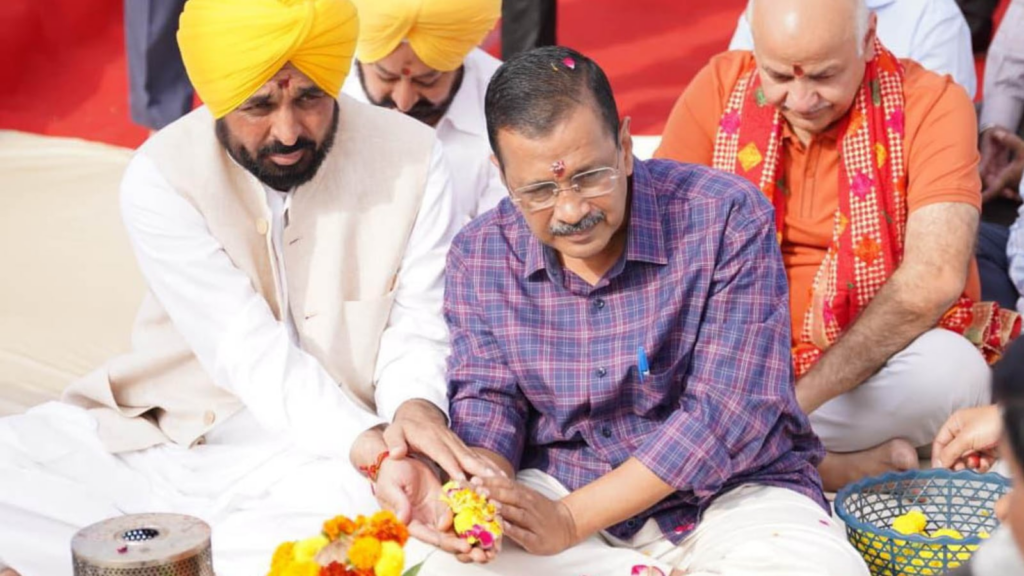The pre-dawn action by the Punjab Police last week against newspaper distribution vans in several towns has revived charges against the Aam Aadmi Party government in the state of crushing dissent.
The day before newspapers, including The Indian Express, could not be distributed on time in the Punjab capital, they had carried the BJP’s allegations that AAP supremo Arvind Kejriwal had got for himself a ‘Sheesh Mahal 2.0’ in Chandigarh.
One of the main lines of attack of the BJP against Kejriwal in the Delhi Assembly elections early this year was that Kejriwal had turned the Delhi Chief Minister’s residence into a luxurious ‘Sheesh Mahal’; the polls led to the AAP’s defeat and the BJP’s return to power in Delhi after nearly three decades.
Special DGP (Law and Order) Arpit Shukla said the police stopped newspaper delivery vans on October 31 in wake of intelligence inputs that these may be used to smuggle drugs and ammunition, and that border state Punjab needed to be cautious. While the vans were released later, distribution was disrupted across all Chandigarh districts, except Mohali.
AICC secretary Pargat Singh said the Bhagwant Singh Mann government was trying to “prevent” news from reaching the public about Kejriwal living in a government bungalow in Chandigarh – he has been spending long lengths of time in Punjab after losing power in Delhi.
Leader of the Opposition Partap Singh Bajwa of the Congress called “raids” on newspaper delivery vans “a chilling attack on press freedom”. “Arvind Kejriwal and Bhagwant Mann are walking the same path as Modi. Both have no faith in democracy or the Constitution that defines India.”
The previous day, the BJP described the bungalow in Sector 2 where Kejriwal lived while in Chandigarh as a “seven-star” facility and a “Sheesh Mahal 2.0”. The AAP denied the charges, saying the bungalow was only “a camp office”.
Just days before the controversy, in a move that raised eyebrows, the Mann government transferred Ajoy Sinha, the Principal Secretary, Power, and the CMD of Punjab State Power Corporation Ltd and Punjab State Transmission Corporation Ltd. Sinha, who is yet to be given any posting, is a 1996-batch IAS officer with a reputation for independence.
“Sinha is not confrontational,” said a senior bureaucrat who worked with him, “but he did insist on due process and transparency.” According to the official, the transfer had had a palpable chilling effect. “The message was clear. Fall in line or fall out,” said a senior IAS officer, requesting anonymity.
In September, AAP Sanour MLA Harmit Singh Pathanmajra was booked by the Punjab Police in a three-year-old case on charges of rape, cheating, and criminal intimidation. He was arrested, but managed to escape and remains on the run, despite the state’s Anti-Gangster Task Force looking for him.
Pathanmajra’s arrest came a day after he attacked the AAP government’s handling of flood relief in Punjab. He accused the government of being inefficient, and said the bureaucracy was not allowing it to perform. He also claimed the AAP’s Delhi leadership “interfered” in the Punjab government affairs – a charge that others have made before him.
Before Pathanmajra, AAP Jalandhar (Central) MLA Raman Arora was booked and arrested on May 23, for allegedly duping individuals in collusion with government officials. There were reports of Arora cozying up to the BJP, when the arrest came.
In late June, Amritsar (North) MLA Kunwar Vijay Pratap Singh, a former IPS officer, was suspended from the AAP for five years after he publicly questioned the Mann government’s handling of a disproportionate assets case against senior Akali Dal leader Bikram Singh Majithia, who is under arrest. He also castigated the Mann government for failing to show any progress in the decade-old Bargari sacrilege case.
In March, Gurkirat Kirpal Singh, a 2001-batch IAS officer, was removed as Home Secretary and remains without any charge seven months later. The action against Gurkirat, who also held the charge of Mines and Geology, and was Commissioner, Food and Drug Administration, and Gurdwara Elections, came soon after he attended the wedding ceremony of Akali Dal leader and Deputy Chief Minister Sukhbir Singh Badal’s daughter.
After his removal, allegations were made that there was pressure on Gurkirat to clear some sand mining files.
A month later, Varinder Kumar, an IPS officer, was removed as the Vigilance chief, and not given any posting. Later, he was appointed as Special DGP (Human Rights) till he retired on July 31. As Vigilance chief, Kumar handled several high-profile cases involving former Congress ministers, including Bharat Bhushan Ashu, Sadhu Singh Dharamsot, and Sunder Sham Arora.
AAP spokesperson Neel Garg said there was no truth in the charge that the party curbed dissent using official machinery. “We are a democratic party. We follow the rules of democracy in letter and spirit. We do not do anything which can be questioned,” Garg said.

